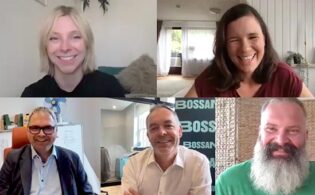Having built TCB Media Rights into a thriving outfit that could feed the needs of numerous outlets, Paul Heaney knew all too well the demanding and rapidly evolving nature of the factual distribution business. So following the downfall of Kew Media Group and TCB’s subsequent sale to Beyond International, Heaney opted to build his new venture, BossaNova—which has the backing of Herbert L. Kloiber’s Night Train Media—as one that was “leaner and meaner” than his last one. In this wide-ranging conversation with TV Real, Heaney weighs in on his approach to curating a boutique slate at BossaNova and adapting to the needs of a fast-changing market.
TV REAL: How has this first year of BossaNova been?
HEANEY: Very hard! Launching when we did was crazy! Our Development Day in January—which we will repeat—where we had 55 buyers, some of whom were on there for ten hours, kickstarted the business. You can’t hit the ground running with a scratch business when you launch in a pandemic. But we did in January. We had 77 projects and 29 producers. That was the springboard because that was a point of difference between us and other distributors; after that, it gathered momentum. We need to hire people quickly to cope with the sheer volume now. All the work we’ve done is starting to pay off.
TV REAL: What’s been the approach to building your catalog?
HEANEY: I like to think we’re building a slate rather than compiling a catalog. The point of difference I’ve tried to make is working at a much, much earlier stage. We learned from our TCB experience. Distributors can work at an even earlier stage if you’ve gathered enough market intelligence and are useful for [the producers]. You have to take risks and work early. Those are the big differences from starting TCB eight years ago. We managed to sashay through till Kew bought us—up to £10 million to £11 million turnover, with no overdraft, no debt. The market is different now. Any distributor that has the same setup or size they did in 2013/14 is probably going to be struggling now. You’re not going to be able to get content without putting in a decent deficit. That’s just the way it is. Whereas nine, ten years ago, 90 percent of shows were fully funded, now it’s probably the opposite. Or it’s fully funded, but there are no rights for those shows coming out of the streamers. Content that is available for distribution, most of it will need a deficit, and that deficit won’t be small. You can have a lean and mean business that is quite profitable, but you have to have a war chest to spend on content. Eight years ago, I was obsessed with picking up hours and hours of content because I felt that was the right thing to do. Now, I’ve turned away so much because I’m not interested in that strategy as much. What’s the point if it slows you down? I want to bring content in that is going to do a job and has an appeal.
TV REAL: The needs of the various players in the market are so different. How do you structure the team to make sure you’re set up to pursue all those opportunities?
HEANEY: I’m just going where the opportunities are. The streamers are still co-producing; they don’t want to fully fund everything. The linear [channels] don’t want to co-produce everything; they want to fully fund some things. There is room for collaboration, especially if people know you can access money and you’re willing to take a risk, or you have market intelligence and you can bring partners in. Jeff Norton, who had a company at Kew, used a brilliant pool party analogy to describe how partners come on board a scripted project, i.e., one jumps in, the rest follow. Right now, I’m not sure having a distributor as your sole commissioner without any buyers attached [presents] the project in the strongest light. There is a lot of trust behind the platforms’ editorial integrity. With distributors, we are growing that integrity, but we’re not there yet. If a commissioning platform sees that a distributor is commissioning something, the first thing that goes into some of their heads is: This is opportunist, you’ve seen a gap in the market, you’re not doing it for the editorial. Maybe that will come as distributors get more sophisticated and have proper platforms that have a consumer-facing angle. So maybe at the beginning anyway, you give the round-peg producers round-peg projects to work on. Having said that, we know the cross-pollination of creative and themes works. It can work brilliantly, where producers have turned their skills to another genre and it’s been a runaway success. But for what we’re doing, we’re trying to get credibility for this style of work. We have six or seven BossaNova originals that all have broadcasters attached.
TV REAL: What key genres are you pursuing?
HEANEY: We have the CJZ/Greenstone catalog, which was a big win for us—it’s about 1,000 hours. I don’t obsess about hours; I obsess about returning brands and new brands. They have lots of those, which gives a value beyond the number of hours. I am indebted to them, and I want to ensure that they see bigger receipts than they’ve ever seen before. They’re preeminent in their world—Motorway Patrol, Highway Patrol, Border Patrol, Dog Patrol, Highway Cops. These are broad-based enduring fact-ent brands that sell well across the world. There’s a commonality and attraction to a big market there that is vital for us as a business. There are two poles: the returnable, repeatable, scalable—it doesn’t matter what genre it’s in—and then you have the one- to four-part premium. In terms of subjects, it’s true crime, history, adventure, paranormal, hidden-world docs, blue light, ob-doc series, engineering, mysteries, quick turnaround, straightforward docs, maybe natural history. We’ll go where we think the demand is. Sometimes you second-guess the market and get it wrong. We’re going to go where the demand is but keep it broad. We’re not going to go just to build up a catalog.
TV REAL: Tell me more about Development Days.
HEANEY: We started them back in 2015. It was very low-key. One buyer—RMC Découverte in France—and loads of producers. And then it became a few more buyers and a few more. Then we ended up taking over a cinema in SoHo House. And that was about 45 buyers. That is something I had brought to the table that other distributors hadn’t been doing. The challenge is, you stick your neck out a lot. You’re introducing the producer to the buyer, so you have to take the gamble that there’s an element of trust there and they won’t go behind your back. You have to operate on a level of trust. You have to establish it as a community. And it worked because it gravitated the right ideas in. There are many examples of projects from Development Days that have gone on to be recommissioned or sell well. It’s a great way for the broadcasters themselves to talk to each other, which is the most rewarding thing. We had to get one going again—in the teeth of Covid, with no office. We got a location to make the event take place, thanks to Spark Media, and the rest took care of itself as my colleague Jasmin [Joseph] created and produced the day single-handedly. It gives you oxygen to market intelligence. We built an interactive voting system, so you could see what people wanted, what people didn’t want—the data was so valuable. We can bring that back to the producers. We can tell them why the show did work or why it didn’t. What the trends were on the day. From that Development Day, there are still 20 to 25 projects that are in play. And so far, between five and ten are in production. We did vet them heavily. What’s the point of a producer wasting his time? Don’t pitch that one but pitch those two or three. It gave us opportunities to be able to grow the business, to know what to go out and acquire, to know what the buyers want. It’s the aspect of the job I find most rewarding because it puts us front and center in the world where we want to be, and it makes us vital. That’s what you want your business to be. The point of this now is, get these producers funded on their projects and into the black as quickly as possible so that when season two comes around or another project comes around, they can say, that last deal with BossaNova, we’re seeing money. We don’t want to be sitting on a load of turkeys. We want to see hits. Sometimes you have to play a long game; it doesn’t happen straight away. And we don’t want to sell things for bargain-basement prices. We want to suss the market out and get things moving, but not at a detriment to the revenues.
 TVREAL
TVREAL






